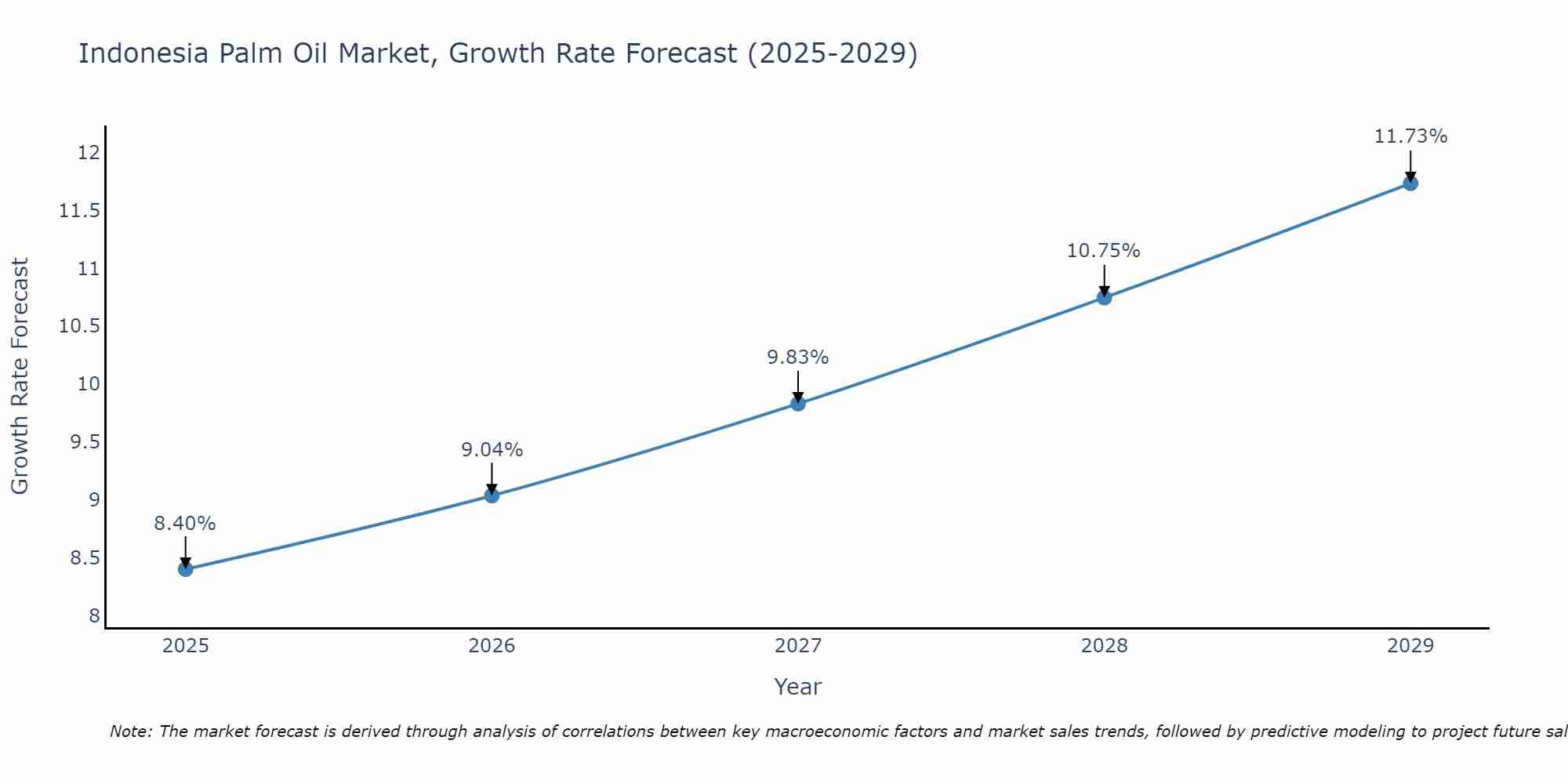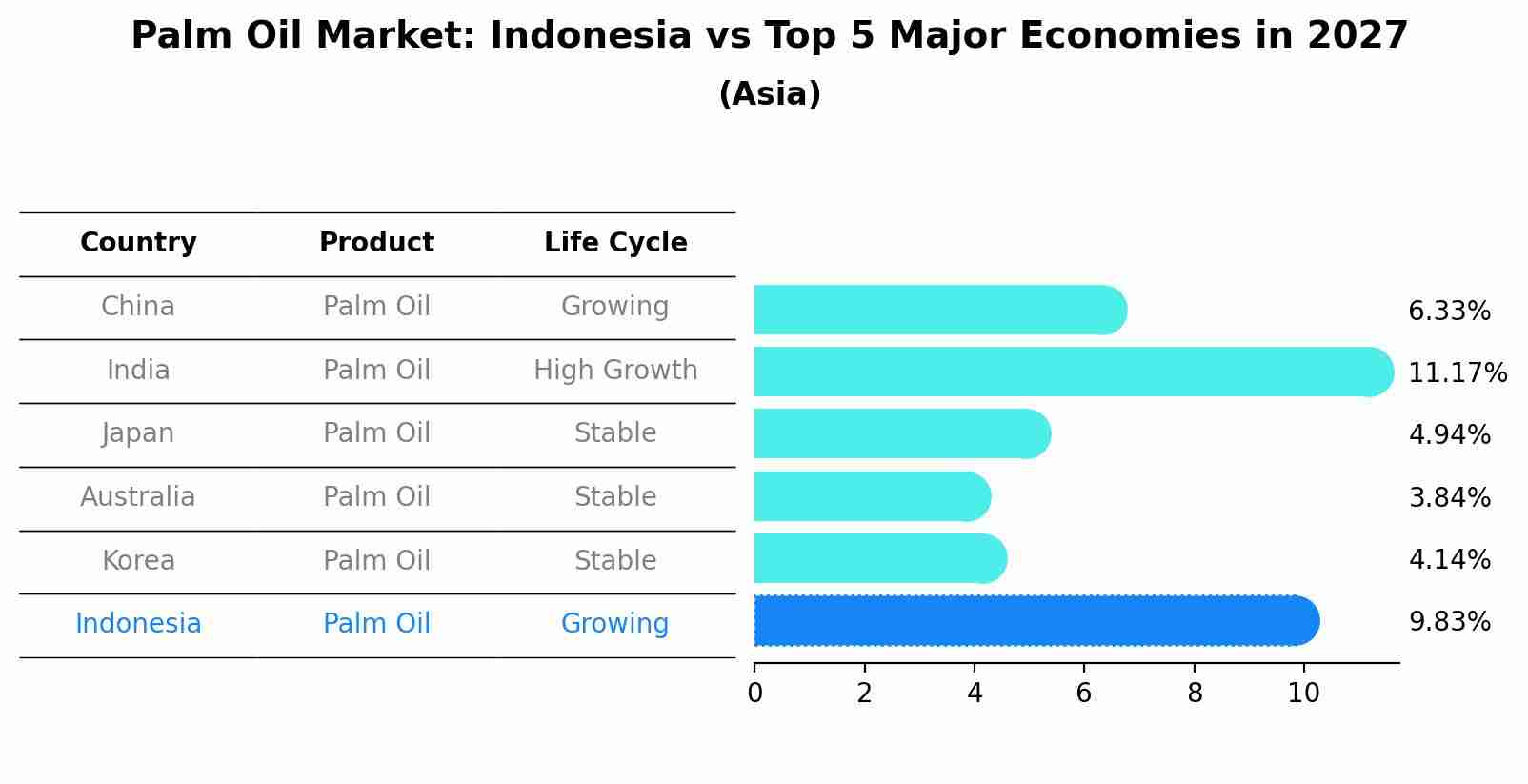Indonesia Palm Oil Market (2025-2031) Outlook | Analysis, Forecast, Trends, Value, Industry, Size, Companies, Growth, Revenue & Share
| Product Code: ETC383788 | Publication Date: Aug 2022 | Updated Date: Apr 2025 | Product Type: Market Research Report | |
| Publisher: 6Wresearch | Author: Ravi Bhandari | No. of Pages: 75 | No. of Figures: 35 | No. of Tables: 20 |
Indonesia Palm Oil Market Size Growth Rate
The Indonesia Palm Oil Market is likely to experience consistent growth rate gains over the period 2025 to 2029. The growth rate starts at 8.40% in 2025 and reaches 11.73% by 2029.

Palm Oil Market: Indonesia vs Top 5 Major Economies in 2027 (Asia)
The Palm Oil market in Indonesia is projected to grow at a growing growth rate of 9.83% by 2027, within the Asia region led by China, along with other countries like India, Japan, Australia and South Korea, collectively shaping a dynamic and evolving market environment driven by innovation and increasing adoption of emerging technologies.

Indonesia Palm Oil Market Synopsis
Indonesia is a global leader in palm oil production, making the palm oil market a significant part of the country`s economy. Palm oil is widely used in various industries, including food processing, cosmetics, and biofuels. However, the industry has faced challenges related to sustainability and environmental concerns, prompting the government to introduce stricter regulations and sustainability certification programs. Despite these challenges, the palm oil market remains a major player in Indonesia`s agricultural sector, with continued domestic and international demand.
Drivers of the Market
The Indonesia Palm Oil Market remains a significant contributor to the country`s economy, driven by its versatile applications in food, cosmetics, and biofuels. Key drivers include high productivity of oil palm trees, favorable climatic conditions, and the government`s support for palm oil production. However, sustainable practices and responsible sourcing are becoming crucial drivers as consumers and international markets demand more eco-friendly and socially responsible palm oil production.
Challenges of the Market
The palm oil industry in Indonesia faces challenges related to sustainability and environmental impact. Deforestation and habitat destruction associated with palm oil plantations have attracted global criticism. Addressing these environmental concerns while meeting the global demand for palm oil is a complex challenge. Additionally, fluctuating palm oil prices and market volatility can impact the profitability of palm oil producers.
COVID-19 Impact on the Market
Indonesia is one of the largest producers and exporters of palm oil globally. The outlook for the Indonesian palm oil market remains positive. Despite initial disruptions caused by the COVID-19 pandemic, the industry rebounded swiftly. Demand for palm oil in various sectors, including food, cosmetics, and biofuels, has remained strong. The government`s commitment to sustainable practices and certifications has also boosted Indonesia`s palm oil exports, ensuring market stability. However, the industry still faces environmental and social challenges, including deforestation and labor issues, which need continued attention for long-term sustainability.
Key Players in the Market
Indonesia is one of the world`s largest producers of palm oil, and this market plays a crucial role in the country`s economy. Key players in the Indonesia Palm Oil market include multinational corporations like Wilmar International and Sime Darby, who have extensive plantations and vertically integrated operations. These companies have been focusing on sustainability practices to meet the increasing global demand for sustainable palm oil. Additionally, domestic players like PT. IndoPalma and PT. AgroMaju are also significant contributors to the market, ensuring a competitive landscape.
Key Highlights of the Report:
- Indonesia Palm Oil Market Outlook
- Market Size of Indonesia Palm Oil Market, 2024
- Forecast of Indonesia Palm Oil Market, 2031
- Historical Data and Forecast of Indonesia Palm Oil Revenues & Volume for the Period 2021-2031
- Indonesia Palm Oil Market Trend Evolution
- Indonesia Palm Oil Market Drivers and Challenges
- Indonesia Palm Oil Price Trends
- Indonesia Palm Oil Porter's Five Forces
- Indonesia Palm Oil Industry Life Cycle
- Historical Data and Forecast of Indonesia Palm Oil Market Revenues & Volume By Nature for the Period 2021-2031
- Historical Data and Forecast of Indonesia Palm Oil Market Revenues & Volume By Organic for the Period 2021-2031
- Historical Data and Forecast of Indonesia Palm Oil Market Revenues & Volume By Conventional for the Period 2021-2031
- Historical Data and Forecast of Indonesia Palm Oil Market Revenues & Volume By Product for the Period 2021-2031
- Historical Data and Forecast of Indonesia Palm Oil Market Revenues & Volume By CPO for the Period 2021-2031
- Historical Data and Forecast of Indonesia Palm Oil Market Revenues & Volume By RBD Palm Oil for the Period 2021-2031
- Historical Data and Forecast of Indonesia Palm Oil Market Revenues & Volume By Palm Kernel Oil for the Period 2021-2031
- Historical Data and Forecast of Indonesia Palm Oil Market Revenues & Volume By Fractionated Palm Oil for the Period 2021-2031
- Historical Data and Forecast of Indonesia Palm Oil Market Revenues & Volume By End-use for the Period 2021-2031
- Historical Data and Forecast of Indonesia Palm Oil Market Revenues & Volume By Food & Beverage for the Period 2021-2031
- Historical Data and Forecast of Indonesia Palm Oil Market Revenues & Volume By Personal Care & Cosmetics for the Period 2021-2031
- Historical Data and Forecast of Indonesia Palm Oil Market Revenues & Volume By Biofuel & Energy for the Period 2021-2031
- Historical Data and Forecast of Indonesia Palm Oil Market Revenues & Volume By Pharmaceuticals for the Period 2021-2031
- Historical Data and Forecast of Indonesia Palm Oil Market Revenues & Volume By Others for the Period 2021-2031
- Indonesia Palm Oil Import Export Trade Statistics
- Market Opportunity Assessment By Nature
- Market Opportunity Assessment By Product
- Market Opportunity Assessment By End-use
- Indonesia Palm Oil Top Companies Market Share
- Indonesia Palm Oil Competitive Benchmarking By Technical and Operational Parameters
- Indonesia Palm Oil Company Profiles
- Indonesia Palm Oil Key Strategic Recommendations
Frequently Asked Questions About the Market Study (FAQs):
- Single User License$ 1,995
- Department License$ 2,400
- Site License$ 3,120
- Global License$ 3,795
Search
Thought Leadership and Analyst Meet
Our Clients
Related Reports
- Afghanistan Rocking Chairs And Adirondack Chairs Market (2026-2032) | Size & Revenue, Competitive Landscape, Share, Segmentation, Industry, Value, Outlook, Analysis, Trends, Growth, Forecast, Companies
- Afghanistan Apparel Market (2026-2032) | Growth, Outlook, Industry, Segmentation, Forecast, Size, Companies, Trends, Value, Share, Analysis & Revenue
- Canada Oil and Gas Market (2026-2032) | Share, Segmentation, Value, Industry, Trends, Forecast, Analysis, Size & Revenue, Growth, Competitive Landscape, Outlook, Companies
- Germany Breakfast Food Market (2026-2032) | Industry, Share, Growth, Size, Companies, Value, Analysis, Revenue, Trends, Forecast & Outlook
- Australia Briquette Market (2025-2031) | Growth, Size, Revenue, Forecast, Analysis, Trends, Value, Share, Industry & Companies
- Vietnam System Integrator Market (2025-2031) | Size, Companies, Analysis, Industry, Value, Forecast, Growth, Trends, Revenue & Share
- ASEAN and Thailand Brain Health Supplements Market (2025-2031) | Strategy, Consumer Insights, Analysis, Investment Trends, Opportunities, Growth, Size, Share, Industry, Revenue, Segments, Value, Segmentation, Supply, Forecast, Restraints, Outlook, Competition, Drivers, Trends, Demand, Pricing Analysis, Competitive, Strategic Insights, Companies, Challenges
- ASEAN Bearings Market (2025-2031) | Strategy, Consumer Insights, Analysis, Investment Trends, Opportunities, Growth, Size, Share, Industry, Revenue, Segments, Value, Segmentation, Supply, Forecast, Restraints, Outlook, Competition, Drivers, Trends, Demand, Pricing Analysis, Competitive, Strategic Insights, Companies, Challenges
- Europe Flooring Market (2025-2031) | Outlook, Share, Industry, Trends, Forecast, Companies, Revenue, Size, Analysis, Growth & Value
- Saudi Arabia Manlift Market (2025-2031) | Outlook, Size, Growth, Trends, Companies, Industry, Revenue, Value, Share, Forecast & Analysis
Industry Events and Analyst Meet
Whitepaper
- Middle East & Africa Commercial Security Market Click here to view more.
- Middle East & Africa Fire Safety Systems & Equipment Market Click here to view more.
- GCC Drone Market Click here to view more.
- Middle East Lighting Fixture Market Click here to view more.
- GCC Physical & Perimeter Security Market Click here to view more.
6WResearch In News
- Doha a strategic location for EV manufacturing hub: IPA Qatar
- Demand for luxury TVs surging in the GCC, says Samsung
- Empowering Growth: The Thriving Journey of Bangladesh’s Cable Industry
- Demand for luxury TVs surging in the GCC, says Samsung
- Video call with a traditional healer? Once unthinkable, it’s now common in South Africa
- Intelligent Buildings To Smooth GCC’s Path To Net Zero


















